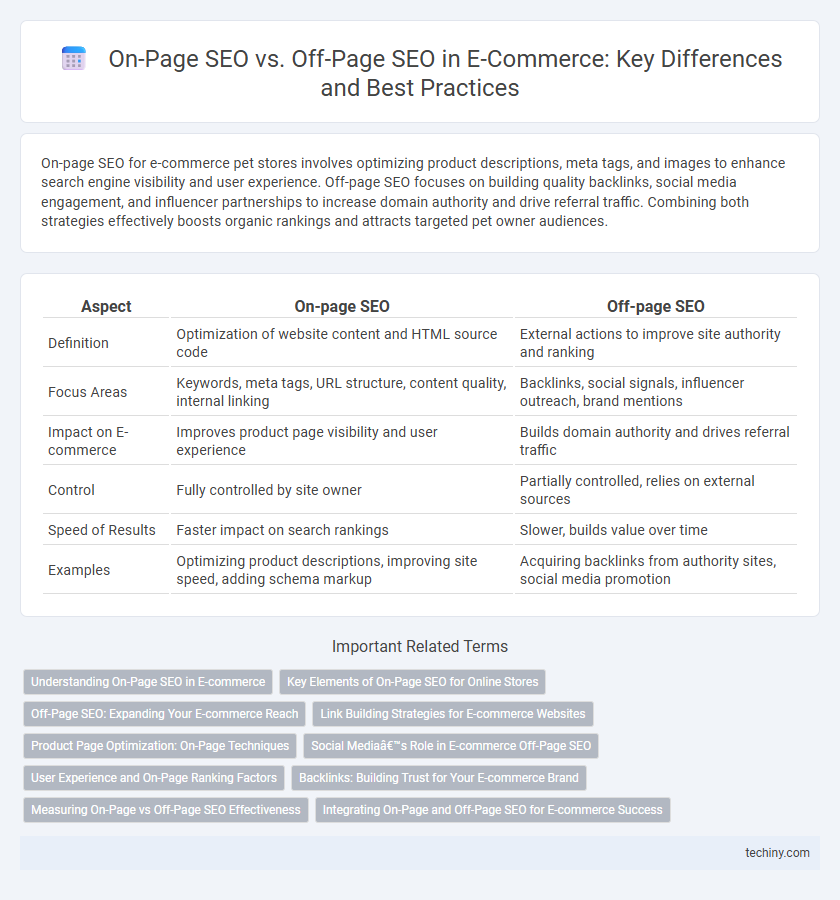On-page SEO for e-commerce pet stores involves optimizing product descriptions, meta tags, and images to enhance search engine visibility and user experience. Off-page SEO focuses on building quality backlinks, social media engagement, and influencer partnerships to increase domain authority and drive referral traffic. Combining both strategies effectively boosts organic rankings and attracts targeted pet owner audiences.
Table of Comparison
| Aspect | On-page SEO | Off-page SEO |
|---|---|---|
| Definition | Optimization of website content and HTML source code | External actions to improve site authority and ranking |
| Focus Areas | Keywords, meta tags, URL structure, content quality, internal linking | Backlinks, social signals, influencer outreach, brand mentions |
| Impact on E-commerce | Improves product page visibility and user experience | Builds domain authority and drives referral traffic |
| Control | Fully controlled by site owner | Partially controlled, relies on external sources |
| Speed of Results | Faster impact on search rankings | Slower, builds value over time |
| Examples | Optimizing product descriptions, improving site speed, adding schema markup | Acquiring backlinks from authority sites, social media promotion |
Understanding On-Page SEO in E-commerce
On-page SEO in e-commerce involves optimizing product titles, descriptions, and metadata to enhance search engine visibility and improve user experience. Structured data markup, such as schema for products and reviews, helps search engines understand content context and improves rich snippet eligibility. Effective on-page SEO also includes optimizing site speed, mobile responsiveness, and internal linking to boost rankings and conversion rates.
Key Elements of On-Page SEO for Online Stores
Key elements of on-page SEO for online stores include optimizing product titles and descriptions with relevant keywords to enhance search visibility. Structured data markup, such as schema for products and reviews, improves rich snippets and click-through rates in search results. Ensuring fast page load times, mobile responsiveness, and intuitive site navigation also contributes significantly to user experience and search engine rankings.
Off-Page SEO: Expanding Your E-commerce Reach
Off-page SEO plays a crucial role in expanding your e-commerce reach by building high-quality backlinks from authoritative websites, which signals trust and improves search engine rankings. Social media engagement and influencer partnerships amplify brand visibility and drive targeted traffic to your product pages. Customer reviews and guest blogging further enhance domain authority, helping e-commerce stores attract more organic traffic and increase conversions.
Link Building Strategies for E-commerce Websites
Link building strategies for e-commerce websites emphasize acquiring high-quality backlinks from authoritative industry blogs, product review sites, and relevant niche forums to improve domain authority and search rankings. On-page SEO complements this by optimizing product descriptions, meta tags, and internal linking structures to enhance user experience and crawlability. Combining targeted link building with on-page keyword optimization drives organic traffic and increases conversion rates for online stores.
Product Page Optimization: On-Page Techniques
Optimizing product pages for e-commerce requires strategic on-page SEO techniques such as incorporating relevant keywords in titles, meta descriptions, and product descriptions to enhance search engine visibility. High-quality images with optimized alt text and fast-loading pages improve user experience and contribute to higher rankings. Structured data markup, including product schema, helps search engines understand product details, boosting click-through rates and driving targeted traffic.
Social Media’s Role in E-commerce Off-Page SEO
Social media plays a crucial role in e-commerce off-page SEO by generating high-quality backlinks, increasing brand visibility, and driving organic traffic to online stores. Platforms like Instagram, Facebook, and Pinterest enable businesses to engage with customers through content sharing, reviews, and influencer partnerships, which boost domain authority and search engine rankings. Social signals from user interactions on these platforms also contribute to improved SEO performance and customer trust.
User Experience and On-Page Ranking Factors
On-page SEO directly enhances user experience through optimized site structure, fast loading times, and mobile responsiveness, which are critical on-page ranking factors for e-commerce platforms. Clear product descriptions, intuitive navigation, and unique content increase user engagement and reduce bounce rates, boosting search engine rankings. Off-page SEO supports on-page efforts by building authority via backlinks, but the foundational user experience improvements stem primarily from on-page SEO.
Backlinks: Building Trust for Your E-commerce Brand
Backlinks serve as critical trust signals for search engines when evaluating the authority of your e-commerce site, directly impacting your organic rankings. High-quality backlinks from reputable websites enhance your domain authority, driving targeted traffic and increasing brand visibility. Focusing on authoritative backlink acquisition through strategies like guest posting, influencer partnerships, and content marketing boosts your e-commerce brand's credibility and long-term SEO success.
Measuring On-Page vs Off-Page SEO Effectiveness
Measuring on-page SEO effectiveness involves analyzing metrics such as keyword rankings, page load speed, meta tag optimization, and mobile usability to ensure optimal site performance and user experience. Off-page SEO effectiveness is evaluated through backlink quality, domain authority, social signals, and referral traffic, reflecting the website's credibility and popularity across the web. Utilizing tools like Google Analytics and Ahrefs enables e-commerce businesses to track both on-page and off-page SEO metrics, providing comprehensive insights to enhance overall search engine visibility and drive targeted traffic.
Integrating On-Page and Off-Page SEO for E-commerce Success
Integrating on-page SEO elements such as optimized product descriptions, meta tags, and structured data with off-page SEO strategies like quality backlinks and social media engagement drives e-commerce success by improving search engine rankings and enhancing user experience. Effective on-page SEO ensures relevant keyword targeting and site architecture, while off-page SEO builds domain authority and trust. Combining these approaches creates a comprehensive SEO strategy that maximizes organic traffic and conversion rates for online stores.
On-page SEO vs Off-page SEO Infographic

 techiny.com
techiny.com